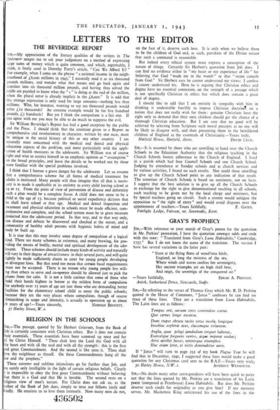RELIGION IN THE SCHOOLS
Sni,--The passage, quoted by Sir Herbert Grierson, from the Book of Job is certainly consistent with Christian ethics. But it does not contain their essentials. These essentials have been summed up once and for all by Christ Himself. " Thou shalt love the Lord thy God with all thy heart and with all thy soul and with all thy strength: this is the first and great Commandment. And the second is like unto it. Thou shalt love thy neighbour as thyself. On these Commandments hang all the law and the prophets." These extreme and sublime injunCtions go far further than Job, and e surely only intelligible in the light of certain religious beliefs. Clearly t is impossible to obey the first great Commandment without believing t there is a God and that He is lovable. The second rests on a eligious view of man's nature. For Christ does not ask us, as the uthor of the Book of Job does, simply to treat our fellows justly and .ncily. He requires us to love them intensely. Now many men do not, on the face of it, deserve such love. It is only when we believe them to be the children of God and, as such, partakers of the Divine nature that such a command is reasonable.
But indeed every ethical system must express a conception of the nature of things. Certainly Sir Herbert's quotation from Job does. I can find no evidence either in " my heart or my experience of life " for believing that God " made me in the womb " or that " terror cometh from God." Sir Herbert says he cannot understand my views: I confess I cannot understand his. Here he is arguing that Christian ethics and dogma have no essential connexion, on the strength of a passage which is not specifically Christian in ethics but which does contain a great deal of dogma.
I should like to add that I am entirely in sympathy with him in thinking it undesirable forcibly to impose Christian doctrinet on a nation that does not really wish for them: genuine Christians have the right only to demand that their own children should get the chance of a thorough Christian education. But I am sure that no good will be achieved by selecting from Scripture such moral precepts as no one will be likely to disagree with, and then presenting them to the bewildered children of England as the essenuals of Christianity.—Yours truly,






















 Previous page
Previous page